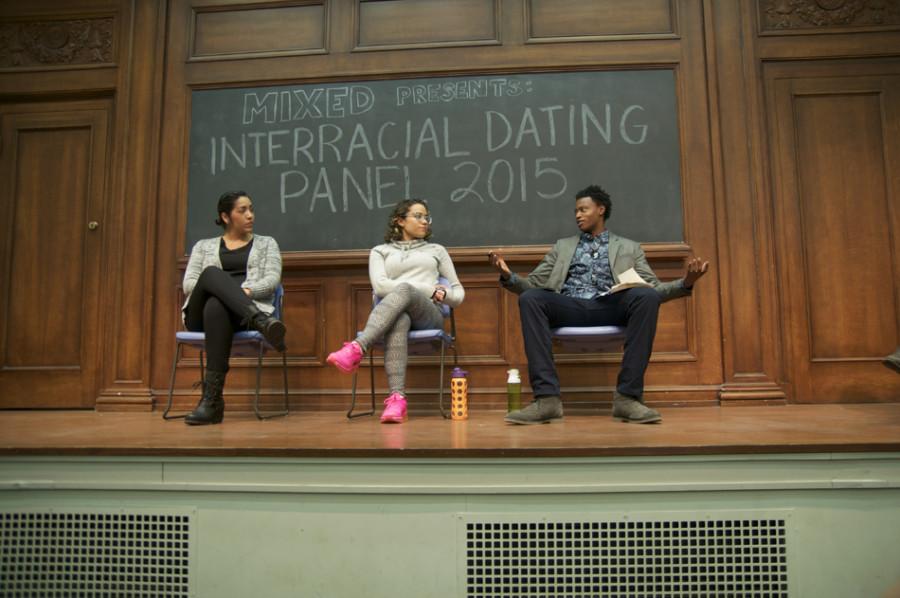Panel discusses effect of race in relationships in second interracial dating panel
Sophie Mann/The Daily Northwestern
Kai Green, post-doctoral fellow in sexuality and African American studies, speaks at a panel about interracial dating and mixed-race people. The Mixed Race Student Coalition held the panel Thursday as an early celebration of Loving Day, which commemorates the Supreme Court’s legalization of interracial marriage.
March 6, 2015
Jakara Hubbard said she has been told throughout her life that her race is a problem and must be difficult to deal with.
Hubbard, who identifies as mixed race, spoke Thursday about different perspectives about mixed-race people during a panel on interracial dating at Northwestern.
The panel, hosted by the Mixed Race Student Coalition, discussed how relationship dynamics differ in monoracial and interracial relationships before a room of more than 80 people. The panel was a celebration of Loving Days, a series of events that commemorate the Supreme Court case Loving v. Virginia, which legalized interracial marriage.
Panelists included Hubbard, a couple and family counselor, Cristina Ortiz, a graduate student at the University of Chicago, and Kai Green, a postdoctoral fellow at NU.
People in interracial marriages primarily argue over child rearing and gender roles in the relationship, which are influenced by how someone was raised culturally or racially, Hubbard said.
“Spanking and whooping is a huge one… those are specific things,” she said. “If I’m working with a minority family they’ll say, ‘I just whooped them,’ and I’ll get a Caucasian family and they’ll tell me something different about punishment because there are different things accepted in different cultures.”
Weinberg junior Cassie Sham, academic events chair of MIXED, moderated the panel and asked about the perceptions of race. Ortiz said there is a certain hierarchy in the way people view different races.
“The whole idea is you’re doing better or you’re advancing your groups, versus if it’s someone who your family member considered to lower the racial hierarchy, (someone’s family) would have an issue with it,” Ortiz said.
Hubbard said she once dated a South Indian man whose mother identified her as black, and would therefore refuse to call her by her name. Hubbard is mixed race, yet in that particular situation, she said, she was immediately identified as black.
She brought up the issue that people of mixed race often don’t fit into one particular category. When asked what race she is, she said she has the options of answering black or mixed.
Similarly, Green said many view President Barack Obama as the first black president. However, Obama is mixed race, yet people attach him to certain stereotypes because of how he looks to the public, he said.
“If you said that you’re just black then you’re excluding the other side, if you say you’re multiracial, you’re excluding the black side,” Ortiz said. “You can’t really make any categories because each side is going to feel left out.”
Sham said though the event didn’t have as high a turnout as she had hoped for because students were busy in the days leading up to Dance Marathon, she thought the panel turned out well and the panelists had interesting things to say. As a mixed-race person herself, she said she found much of the discussion applicable to her own life.
“I probably won’t be in a relationship with someone who’s the same mix as I am, but it was really important,” she said. “There are still people who aren’t going to date interracially but now there are fewer barriers to that.”
Email: [email protected]


